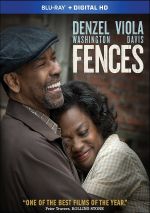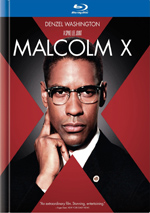|
PARAMOUNT
|

| |
|
MOVIE INFO
|
|
Director:
Denzel Washington
Cast:
Denzel Washington, Viola Davis, Stephen McKinley Henderson, Jovan Adepo
Writing Credits:
August Wilson
Synopsis:
A working-class African-American father tries to raise his family in the 1950s, while coming to terms with the events of his life.
MPAA:
Rated PG-13.
| |
|
DISC DETAILS
|
Presentation:
Aspect Ratio: 2.40:1
Audio:
English DTS-HD MA 7.1
English Audio Description
Subtitles:
English
French
Spanish
Closed-captioned
Supplements Subtitles:
English
French
Spanish
Runtime: 138 min.
Price: $39.99
Release Date: 3/14/2017
Bonus:
• “Expanding the Audience” Featurette
• “The Company of Fences” Featurette
• “Building Fences” Featurette
• “Playing the Part” Featurette
• “August Wilson’s Hill District” Featurette
| |
|
PURCHASE @ AMAZON.COM
|

| |
|
EQUIPMENT
|
Panasonic TC-P60VT60 60-Inch 1080p 600Hz 3D Smart Plasma HDTV; Sony STR-DG1200 7.1 Channel Receiver; Panasonic DMP-BD60K Blu-Ray Player using HDMI outputs; Michael Green Revolution Cinema 6i Speakers (all five); Kenwood 1050SW 150-watt Subwoofer.
| |
|
RELATED REVIEWS
|

| |
|
Fences [Blu-Ray] (2016)
|
|
Reviewed by Colin Jacobson (March 6, 2017)
For the third time in his career – and the first occasion since 2007’s The Great Debaters, Denzel Washington directs a film via 2016’s Fences. Based on August Wilson’s Pulitzer-prize winning 1980s play of the same name, Fences takes place in Pittsburgh circa the 1950s.
Former Negro League player Troy Maxon (Washington) was too old to make the cut when Major League Baseball started to allow African-Americans to participate. Now a sanitation worker, he remains bitter that he never got this chance at the big time, though he feels convinced his race keeps him from stardom, as even in his fifties, Troy thinks he could hit Major League pitching.
Troy lives with his wife Rose (Viola Davis) and son Cory (Jovan Adepo). About ready to go to college, Cory shows skill as a football player and may be able to get a scholarship in that capacity.
Due to his own life experiences, Troy reacts negatively to Cory’s potentially rosy future and this causes tension in the home. Other threads combine to demonstrate the struggles of the Maxon family.
For me, Fences came with two potential pitfalls, one of which stemmed from Washington’s directorial résumé. As mentioned, he led two earlier flicks: Great Debaters and 2002’s Antwone Fisher. Neither movie did much for me, as both showed a few highlights but they seemed generally mediocre.
In addition, I admit some bias against movies adapted from stage plays, as I think a lot suffer from what I call Raisin in the Sun Syndrome. That film felt like the producers did nothing more than film the stage production, as it did little to take advantage of cinematic possibilities.
I hoped that Fences might overcome these possible problems, but unfortunately, both make the experience less than involving. For one, Fences really doesn’t do much to come across like anything other than what it is: an adaptation of a play. The basics of the stage production remain firmly in place, and it feels like it, as the screenplay lacks an impression of cinema.
August Wilson adapted his own play into a script, and that may have been a mistake. Wilson’s only prior screenplay came from 1995’s The Piano Lesson, and that TV movie also required Wilson to rework his own stage production.
I can’t help but think that someone with more screenwriting experience could’ve made Fences into something more than a “filmed play”. The script still offers scope and dialogue that feel heavily indebted to the stage production, and these elements don’t make the leap to the screen well.
While they share a lot of similarities, movies and stage productions remain different enough that what works in one often flops in the other. In the case of Fences, we get a dramatic structure that tends to emphasize characters who come and go in artificial ways and who speak in monologues.
Boy, does Fences provide us with a lot of speeches! Characters often grab the spotlight with gusto so they can give us a long piece of narration.
On stage, this could work, as plays come with an inherent lack of naturalism. They take place in a clearly artificial environment and require audience members to accept a certain suspension of disbelief.
A much more naturalistic format, movies require a stronger sense of reality – at least for stories like this. Sure, we’ll accept fantasy and illogic for some films, but Fences intends to tell a true human tale, so it needs to function as an extension of real life.
Which it doesn’t, partly due to those stage-bound conceits that Wilson deploys. Whereas those long monologues dazzle on the stage, on the screen, they feel contrived and awkward. At times you wonder if the actors will pause for applause – everything seems far too heavily connected to the construct of the stage production, especially since everyone speaks in speeches and exposition.
As a director, Washington lacks the skill to enliven the proceedings and give the picture the cinematic sheen it needs. Washington simply shows little talent behind the camera – as depicted here, he can execute the basics, but he can’t offer more panache or flair than that.
This means Fences borders on the “filmed stage production” impression I feared. Washington shows little appreciation for various cinematic techniques, so the end result feels like the crew showed up, they plopped down the camera and left for lunch as the actors emoted.
That simplifies matters, of course, but I remain left with the impression that Fences fails to understand the need to broaden horizons. The movie lacks visual flow and tends to lay flat on the screen.
All the actors do fine in their parts, so I can’t complain about them. Despite the broadness of the over-written dialogue, Washington, Davis and the rest manage to tone down the roles and give them reasonable humanity – well, except perhaps for Mykelti Williamson, who plays Troy’s mentally disabled brother like a cartoon version of Lenny from Of Mice and Men.
Despite the actors’ best efforts, Fences doesn’t work as a movie. As a stage play, it would fare better, but it fails to translate the material to the screen in a satisfying manner.
|
The Blu-ray Grades: Picture B+/ Audio C+/ Bonus C-
|
|
Fences appears in an aspect ratio of approximately 2.40:1 on this Blu-ray Disc. This became an appealing presentation.
At most times, sharpness looked good. A few shots came across as a little soft, but those didn’t create substantial distractions, so the majority of the film appeared well-defined. No signs of jaggies or shimmering occurred, and the image also lacked edge haloes or print flaws.
In terms of colors, Fences opted for a golden brown palette. The hues looked rich and warm throughout the film. Blacks came across as dark and dense, while shadows showed nice smoothness and clarity. The movie offered a pleasing transfer.
No one should expect much from the DTS-HD MA 7.1 soundtrack of Fences, as the film’s dimensions left it without much sonic impact. A dialogue-driven character piece, the movie came with occasional snatches of score and gentle ambience.
These elements used the various channels in an acceptable way, but they failed to add much to the proceedings. Honestly, this could’ve been a monaural mix and it would’ve worked just as well, for Fences lacked any form of auditory ambition.
Sound quality was fine. As muted as they tended to be, effects and music showed good clarity and accuracy.
The most important component, speech came across as natural and concise. Though without much to make it stand out, the soundtrack seemed appropriate for the story.
Five featurettes accompany the film, and we start with Expanding the Audience: From Stage to Screen. It goes for eight minutes, 53 seconds and includes comments from Broadway revival director Kenny Leon, ex-wife Constanza Romero Wilson, director/actor Denzel Washington, editor Hughes Winborn, producer Todd Black, production designer David Gropman, costume designer Sharen Davis, cinematographer Charlotte Bruus Christensen, composer Marcelo Zarvos, and actors Viola Davis, Russell Hornsby, Stephen McKinley Henderson, and Mykelti Williamson.
“Audience” looks at the source play and its adaptation for the screen as well as editing, shot composition, costumes, sets and locations, and score. “Audience” attempts to pack a lot of subject matter into a short running time, and it cuts too many corners. It would’ve worked better if it focused just on the translation of the play to the movie and left the rest for another program.
Next comes The Company of Fences. It runs nine minutes, 17 seconds and features Washington, Williamson, Davis, Henderson, Black, Leon, Wilson, Hornsby, and actor Jovan Adeop. This looks at the dialogue from the script/play as well as cast/performances. Much of the program emphasizes praise for the project and all involved, so it lacks much insight.
For the six-minute, 56-second Building Fences, we hear from Washington, Davis, Leon, Wilson, Henderson, Williamson, Hornsby, and Adepo. “Building” discusses Washington’s impact as both actor and director. Mostly it tells us that Washington is great, which means it offers little substance.
Playing the Part lasts six minutes, 57 seconds and delivers notes from Davis, Washington, Wilson, Wiilliamson, Black, Leon, Hornsby and Adepo. “Part” covers the Rose character and Davis’s performance. Other than a couple of decent notes from Davis herself, this turns into another praise-filled piece.
Finally, August Wilson’s Hill District fills six minutes, 25 seconds with remarks from Washington, Davis, Gropman, Wilson, Henderson and Hornsby. This one examines locations as well as production design. Mostly it exists to allow all involved to congratulate themselves for shooting in Pittsburgh, so it finishes the featurettes on a limp note.
Although Fences worked as a stage production, it doesn’t translate to the movie screen all that well. Too much of the film feels contrived and it lacks many cinematic qualities. The Blu-ray boasts very good visuals along with acceptable audio and a smattering of superficial bonus materials. While strong acting bolsters it, Fences feels too much like a filmed stage play for my liking.
|
|
Viewer Film Ratings: 3.25 Stars | Number of Votes: 4 |
|
|

